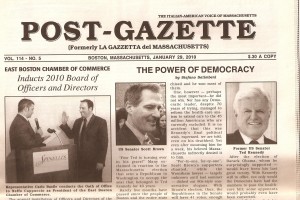 “Poor Ted is turning over in his grave!” many exclaimed in reaction to the Massachusetts election that sent a Republican to Washington to occupy the seat that belonged to Ted Kennedy for 40 years.
“Poor Ted is turning over in his grave!” many exclaimed in reaction to the Massachusetts election that sent a Republican to Washington to occupy the seat that belonged to Ted Kennedy for 40 years.
Barely five months have passed since the people of Boston and the entire state spent a week mourning the man who, by the end of his career, had become the Lion of the Senate.
For 40 years Kennedy gave Massachusetts more national influence than its small population would otherwise have enjoyed, and locally he gave a political voice to those who had never had one. Kennedy fought countless battles for the poor, immigrants, and the disenfranchised, and he won most of them.
One, however—perhaps the most important—he did not win. Nor has any Democratic leader, despite 70 years of trying, managed to reform the health-care system to extend care to the 45 million Americans who are currently excluded. It is no accident that this was Kennedy’s final political wish, expressed, we are told, even on his deathbed. Yet even after mourning him for a week, his beloved Massachusetts indirectly denied it to him.
“For–ty–one, for–ty–one”, Scott Brown’s supporters chanted, while the Wrentham lawyer—largely unknown until last summer—dished out 80s-style conservative slogans. With Brown’s election, thus, the Republicans in the Senate will have 41 votes, enough to deny the Democrats the 60% majority needed to override a filibuster. While the balloons were still drifting down from the ceiling, Brown was already saying: “I will go to Washington without delay to prevent a bad health-care law from being imposed on a majority of Americans who haven’t asked for it and do not want it.”
Of course poor Ted is turning over in his grave! I imagine his restless soul struggling against the tumor that killed him right before what —after the election of Barack Obama, whom he surprisingly supported—would have been his last great victory. With Kennedy still in office, not only would the Democrats have had the numbers to pass the health-care bill; some opponents would probably even have been converted.
Instead Ted has died, his seat has gone to a Republican (and not even a moderate one), and for supporters of health-care reform it’s all uphill from here.
But in other honored graves across America, the Founding Fathers of the world’s oldest democracy are not turning over. Actually, I’m pretty sure they’re rejoicing—if not on substance, at least on principle, in that the Massachusetts vote is proof that the system put in place with the Constitution of 1787 still works pretty darn well.
It is proof that, in a democracy, there are no strongholds or protectorates, just the electors and the elected.
It is proof that, in a democracy, a territory—a state, a county, or a city—does not belong to a family or a political party but only to its residents. In fact, to those resident— unfortunately not too many in America—who, on Election Day, actually bother to leave the house and vote.
It is proof that, in a democracy, neither electors nor elected officials can be taken for granted. The great mistake of Massachusetts Democrats, so confident of their decades-old liberal majority, was to consider this election (after the primary won by State Attorney General Martha Coakley) a mere formality.
So Ms. Coakley, knowledgeable but cold and distant, led a weak and unconvincing campaign while many of her potential supporters assumed that their state was so liberal they could afford to stay home and still see a Democrat win. The result was a difference of over 100,000 votes—out of little more than 2 million—in favor of Scott Brown.
Little did it matter that people cried on Kennedy’s coffin for a whole week; or that a little more than a year ago Obama, supported by Kennedy and himself a Coakley supporter, won the presidential race here by 25 percentage points. A longer-than-expected crisis, a few too many public dollars awarded to the big banks and a few too few to regular Joes—enough, among other things, to make a Democratic-to-the-bone state like Massachusetts change its mind.
Sure, it’s a shame for health-care reform. In a democracy that works, it would be nice to see a health-care system that does too. But if one must choose … Well, the last time I checked, the makeshift boats full of desperate escapees were heading from Cuba to Florida and not the other way around!
Stefano Salimbeni is a free-lance correspondent for RAI, the Italian National Television Network
